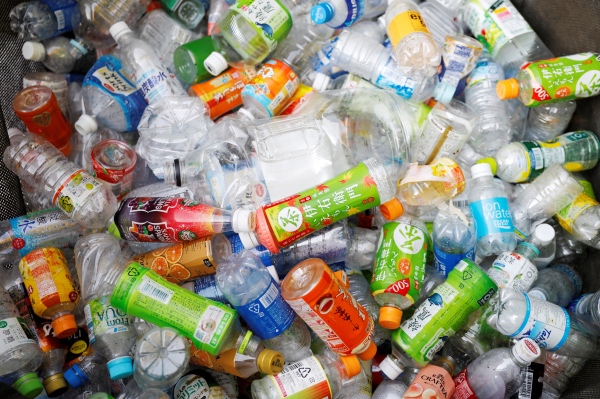Barcelona, Spain
Thomson Reuters Foundation
The world’s biggest yoghurt maker Danone and food packaging giant Tetra Pak are among companies leading a global scheme to reduce plastic waste, launched on Tuesday, as public concern rises over the environmental damage caused by rubbish.
The 3R Initiative – also backed by Swiss food giant Nestle, which owns Perrier and Vittel bottled waters, and French utility Veolia – aims to reduce, recover and recycle more plastic waste by helping companies measure and reach pollution-cutting goals.

Used plastic bottles are seen at a waste collection point in Tokyo, Japan, on 21st November, 2018. PICTURE: REUTERS/Toru Hanai
“We wanted to create a mechanism that could incentivise new and expanded collection and recycling of waste plastic,” said Julianne Baroody, a director at US-based non-profit Verra which will craft new standards for measuring plastic waste.
Companies are trying to improve their environmental record, as consumers become increasingly aware of the damaging impact of plastic, with millions of tonnes of food packaging and bottles ending up in landfills and oceans each year.
Baroody told the Thomson Reuters Foundation that Danone – which produces the popular mineral water brand Evian – had asked for help to meet its recycling targets.
Danone’s goal for 2025 is for every piece of its packaging to be reusable, recyclable or compostable, up from 77 per cent of its plastic packaging in 2017, its website said.
Evian has also pledged to make all its plastic bottles from 100 per cent recycled plastic by 2025, up from 25 per cent at present.
The 3R initiative plans to create by 2021 tradable “plastic credits” to support recycling projects in developing nations, on similar lines to carbon offsets, although it aims to be more rigorous in setting rules for the credits, Baroody said.
Verra runs the world’s largest voluntary carbon credit market, which allows approved projects to turn their greenhouse gas emissions reductions into tradable credits, the group said on its website.
Projects that support recycling in developing countries will be vetted and registered and then issued with credits, according to the amount of plastic recovered or reused.
These could then be bought by large firms with goals like using 100% recycled plastic in their products, as many are tough to meet due to a lack of available materials and the transition time needed, Baroody said.
The money paid for the credits would go to the plastic projects, for example to improve conditions and pay for poor waste pickers and recyclers in Brazil.
More than a dozen pilot credit-issuing projects will be developed in “plastic leakage hot-spots” in Latin America, Africa and Southeast Asia, the 3R Initiative said.






